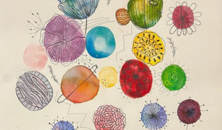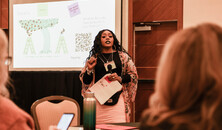Increasing visibility and voice of Native students
Spokane’s Jeremy Rouse honored for providing cultural learning opportunities
Spokane Education Association member and Achievement Gap Intervention Specialist Jeremy Rouse became an education support professional accidentally. The NEA Foundation California Casualty 2020 Washington award recipient was seeking work where he could advocate for others, lead on issues of social justice and inclusion and raise marginalized voices, but he didn’t see public education as a pathway when he first began working for the Title VI Indian Education Program in three of Spokane’s schools in 2013.
It turns out he has found a good fit. With more than 2,000 Native students in Spokane schools, Rouse says a lot of the students with whom he has built relationships face tremendous barriers in achieving academic success.
“Nearly three quarters of our students qualify for free and reduced lunch, experience homelessness or housing instability at a rate twice that of our overall student body,” Rouse says.
“He’s a community resource and advocate. He’s a connector in many ways,” Indian Education Coordinator Bonnie St. Goddard says. “He’s an educator for educators. He is a strong leader. He’s an example for the young Native Americans in the system in providing that positive role for our students.”
Rouse’s job description includes providing “case management” for some 250 students between three schools by monitoring grades, attendance and discipline incidents. If a student appears “at-risk,” he works with them to identify barriers and strategize possible solutions and resources that might help them overcome those obstacles.
But what makes Rouse unique is how he builds relationship and works with students outside of what is happening in the classroom. He created the Nk’wu Nation Native Student Leadership Organization, a group that means “One Nation,” which elevates student voice, encourages leadership and involvement, increases visibility of Native students and provides them with cultural learning opportunities.
All students are invited to participate in a drumming circle. This creates an inclusive space where their identities are celebrated. The group performs both in the Native community and at other community events. Eastern Washington University undergrad Brianna Brockie credits Rouse with helping her connect with her culture and learn more about herself.
“He gave us a sense of identity. He let us know that we were being heard and not being left behind,” Brockie says. “I know that he positively impacted my classmates because we were so involved in our group and we felt powerful when we would drum.”
Rouse says one of the most profound parts of his work is that he has been challenged, inspired and motivated to examine his own identity more deeply. He says this work has forced him to explore and think deeply about his own identity formation.
“It has been a lot of personal growth,” he says. “I was 29 before I sat at the drum and I got to learn these songs so I could sing them with the kids. It’s giving them opportunities that I didn’t have and when they start to have access to opportunities like this in the school space, it’s meaningful and impactful.”
Rouse says he is also proud of the annual First Foods Traditional Dinner at Rogers High School because, “It celebrates the traditional indigenous foods that have sustained tribal people’s since time immemorial.” Before the dinner, he says, many of his students have difficulty naming their own traditional food.
“The First Foods dinner helps students connect with and reclaim knowledge about these foods and by extension, their own cultures,” Rouse says. “I
try to know their tribes and sometimes I have to remind them what their tribe is and that’s part of the disconnection some of them have — they don’t know their tribe. I help to facilitate that reconnection.”
“We’re from Turtle Mountain Chippewa and whenever I come in, me and Jeremy talk about our tribes and our history and our culture,” says Elijah Belgarde, a junior at Rogers High School.
St. Goddard says, “An outside community member had talked about Jeremy not just being a mentor, but a MEN-tor which is more than an advocate — it’s an example for some of the young native boys in the system and providing that positive, empowering leadership role for them.”
“I see my position as trying to ‘indigenize’ this space. School is historically not a friendly space for indigenous students and we’re here to kind of disrupt the system. Am I making these students work better for the system or am I trying to make the system work better for the students? I want to do the latter,” Rouse says.
While Rouse originally got involved with the union when Spokane EA was building up toward a strike a few years ago, he stayed involved for other reasons.
“My mother is in education and I kind of grew up being pro-union,” he says, “But I didn’t have a strong understanding about it and the racial justice and social justice component is part of what motivates me to be involved in the union.”
At last year’s RA, Rouse sponsored a New Business Item that requires recognition that we are guests on native homelands.
“It was a tangible way for me to be an advocate for students. It’s something that allows Native People to remain a part of the conversation when we do land acknowledgement — it’s the bare minimum but it’s a visibility piece that allows us to be seen, heard. It’s not the end, but a starting point.”
Rouse says one of the most important lessons he takes from his work is to focus on creating authentic relationships because it is impossible to accurately identify the barriers faced by a student or their family without “keeping it real” with students, colleagues, families, community members and other stakeholders.





